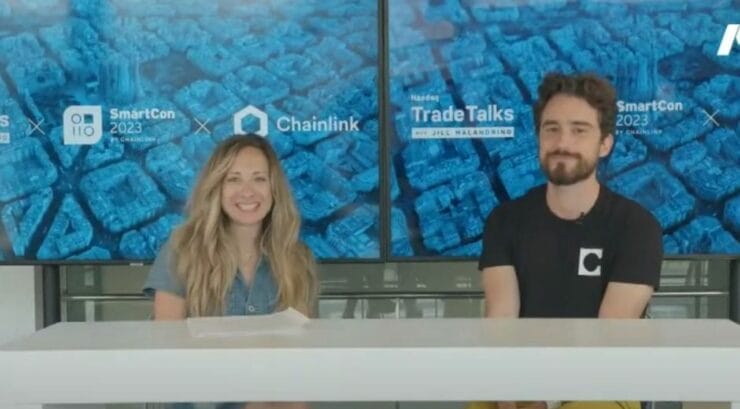SmartCon 2023 featured more than 100 blockchain experts and financial industry leaders including founders of influential protocols in the Chainlink ecosystem. To get a closer look at the future of web3, Nasdaq TradeTalks host Jill Malandrino filmed a two-day interview lineup with speakers at this year’s event in Barcelona, Spain.
Rene Reinsberg is co-founder of Celo, a carbon-negative, permissionless, layer-1 protocol accessible to anyone with a mobile phone. Celo’s ecosystem includes more than a thousand web3 applications geared toward building a regenerative finance (ReFi) economy. Reinsberg sat down with Malandrino to discuss how real-world applications built on Celo benefit people and the planet.
“We started Celo with a desire to bring this great technology that web3 is to regular people,” Reinsberg said. The goal of Celo’s unique architecture is to simplify the user experience of moving assets onchain and participating in sustainability efforts around the world.
Last April, Celo joined Chainlink SCALE to accelerate its ecosystem’s growth by giving developers low-cost access to Chainlink’s industry-leading oracle services. In June, Chainlink Data Feeds went live on Celo mainnet, providing developers with the secure, reliable data needed to build advanced mobile ReFi applications.
In September, global web browser Opera launched its noncustodial stablecoin wallet, MiniPay, on Celo with the goal of onboarding millions of mobile users in Africa to web3.
“It’s really an amazing opportunity to meet people where they are,” said Reinsberg. He explained how MiniPay gives Android users the ability to save and spend stablecoin dollars across Celo’s expanding suite of web3 applications. “It gives people all kinds of other great features like access to microwork, or the ability to learn and earn, or even just earning some yield.”
In Reinsberg’s view, helping people fight high inflation, connecting unbanked communities to the global economy, and supporting ReFi-focused decentralized applications go hand in hand.
“To me, it’s all connected. If you’re aiming to create a new financial infrastructure, then you have an opportunity to do that in a way where it actually has positive externalities on our planet and on our communities.”
Celo, which launched on Earth Day 2020, has been carbon-negative from inception. In addition to offsetting its own footprint, Reinsberg said the protocol provides key building blocks that allow applications built on Celo to offset their own footprints and foster initiatives like conservation incomes that pay people to preserve natural resources.
“We’re starting to see the worlds of climate action, climate finance, and what traditionally would be called financial inclusion come together,” he said. “Obviously, there’s the climate impact, but then you also have this uplift of the community. And to me, that’s really powerful because we’re not trying to tackle these big problems by themselves.”
Watch Jill Malandrino’s full interview with Rene Reinsberg.


